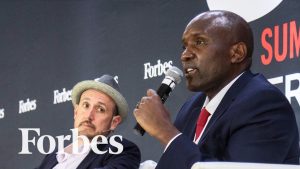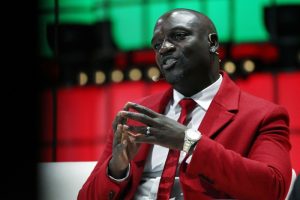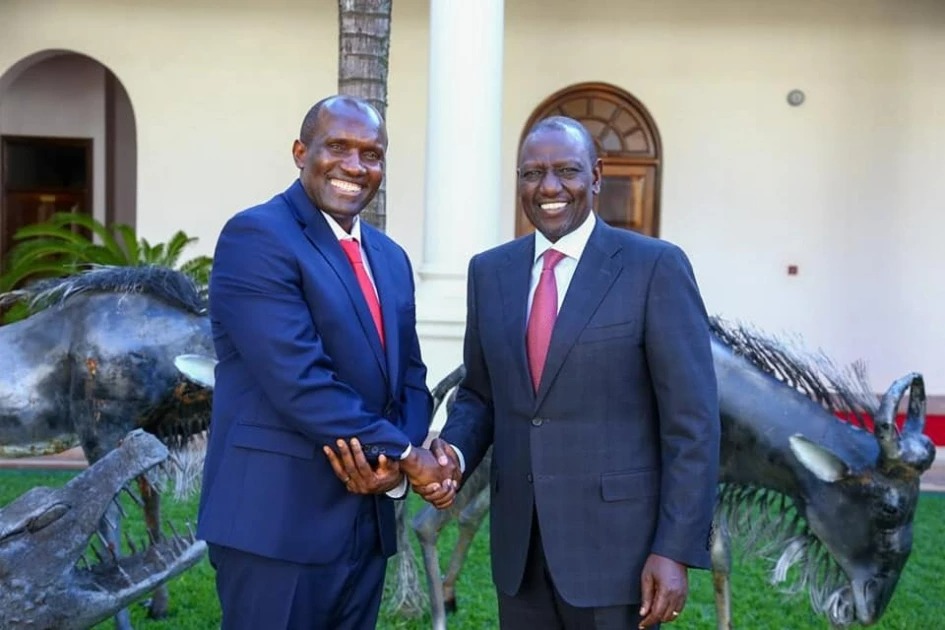Julius Mwale, presented by Forbes magazine as “one of Kenya’s top entrepreneurs”, is fêted for his rags-to- riches life story in which he claims to have created a “multi-billion-dollar” company in the US.
With ambitious and well-publicised projects to build pioneering smart cities in Kenya and Senegal, he enjoys rubbing shoulders with African presidents and celebrities from the worlds of entertainment and sports.
But this investigation by Mediapart tells a different story, one of a trail of claims for unpaid bills, disputes with investors and lenders, and unfinished projects. Clément Bonnerot and Sonia Rolley report.
The story as told by Julius Mwale is one of an Africa that wins, and an African entrepreneur who gives
back to his community. At the Forbes Under 30 Summit Africa, an event held in April this year in Botswana and which presented those who the US business magazine identifies as inspiring models from the continent’s business world, Mwale was given a rapturous welcome.
Before a gathering that included senior officials from several African governments, Randall Lane, who has the title of chief content officer at Forbes, interviewed him on stage in a one-to-one conversation extolling Mwale’s business adventures.

“When you have these rags to riches sagas, sometimes we have orphans,” Lane began. “Other times, maybe it’s someone [who was] poor or homeless, or they were a refugee or an immigrant. But you know, you’re, like, all of those things, which makes your rise even more impressive.”
Mwale, born in the mid-1970s in Kenya, told the audience how his first professional step in life was to join the Kenya Air Force before later emigrating to the US. He explained how he made his fortune in New York where, following the September 11th 2001 terrorist attacks which highlighted financial security issues, “I invented biometric technology used to secure online [banking] transactions”. The technology, he said, was adopted by banks in the US.
His first company, SBA Technologies, was registered in New York in 2003 and, he told the gathering, it “became one of the largest biometric companies in the world”. By 2008, he said, SBA Technologies had “grown into a multi- billion-dollar company”.
Mwale was keen to present his project of a “smart city”, called Mwale Medical and Technology City (MMTC), in western Kenya, which includes a medical structure “that would be able to stop people in Africa from going to India every year for medical treatment”. This, he told Lane, was prompted by his desire to “give back to the community in Kenya” where he grew up, and to “give back to the community in Africa”.
But this investigation by Mediapart reveals not only that Mwale did not create a vast fortune as he claims, but that a number of his projects were never followed through to the end.
Over the past 15 years, this self-proclaimed billionaire has been regularly accused of leaving a trail of unpaid bills in his wake.
Meanwhile, he continues to make waves announcing ambitious projects and associating with heads of state and celebrities to promote his smart city projects in Africa.
Contacted, Mwale’s Kenya-based lawyer, Javier Munzala, dismissed the accusations levelled against his client as being “wild allegations” that were “defamatory and laced with strong racist themes that seem to discredit black people of African descent as conmen”. Munzala proposed that Mediapart meet with Mwale, and visit his smart city project in Kenya at some point “between March and July 2024”.
Rejected patent applications and unpaid rent
In a number of interviews he has given, including that with Forbes, Mwale said that upon first arriving in New York he lived in a shelter for the homeless.
He has also claimed to have gained a diploma from Columbia University. Contacted, a spokesperson for the university said: “We can confirm that Julius Mwale attended Columbia University in 2004, but did not receive a degree from Columbia”.
While he has claimed that his company, SBA Technologies Inc., became a “multi-billion-dollar company” it was never listed on a stock exchange. In 2010 the company was dissolved, before it was revived two years later.
In the mid-2000s, Mwale applied for patents for his secure transaction system in several countries, including the US, Canada and India. None of these applications succeeded. Delivering its opinion on the application, the United States Patent and Trademark Office (USPTO), in a document dated July 9th 2007, found that the technology employed “lacks an inventive step” and contained “obvious” modifications to existing technologies.
In 2009, Jacob’s First LLC, the owner of the building housing the headquarters of SBA Technologies, on New York’s upmarket Fifth Avenue, filed a complaint against the company, and Mwale as guarantor, for unpaid rent, amounting to close to 145,000 dollars. In 2011, Mwale was ordered to settle the unpaid rent. But four years later, the owners of the building had still not been paid and filed a fresh complaint. The sum owed by 2015, both in unpaid rent and interest charges, totalled 209,228.37 dollars.
In July 2010, Dianne Schwartz and Marilyn White, co- directors of an outpatient unit treating people with addictions, filed a complaint before the Supreme Court of the State of New York, claiming they had been deceived into investing 266,000 dollars (133,000 dollars each) in the capital of SBA Technologies. They said that they had been told their investment would increase in value more than 30-fold – at 8.8 million dollars – in the event of the company being listed on the stock exchange.
Their complaint was against SBA Technologies, Julius Mwale and a psychiatrist called Fiona Graham who they said had introduced them to Mwale. Graham had worked at their addiction treatment centre. In 2012, Mwale was ordered to refund the total sum of their investment, plus 58,000 dollars in interest.
A separate and earlier case involved New York lawyer Stanley S. Zinner, who gave Mwale a loan of more than 150,000 dollars, a deal in which Fiona Graham appears again to have been the intermediary. When the loan was not repaid, Zinner filed a legal complaint against Mwale and the latter was ordered by the Supreme Court of the State of New York to refund the lawyer.
When Mwale failed to do so, Zinner took action against Graham, who is co-director of a foundation created by Mwale and his wife Kaila called the American Institute for African Development. Graham did not respond to questions sent to her by Mediapart, while Zinner could not be reached.
The American Institute for African Development
In September 2007, Julius Mwale, his wife Kaila Mwale and psychiatrist Fiona Graham created a not-for-profit entity called the American Institute for African Development (AIAD). On its website, it introduces itself as “a private operating and grant making foundation [sic]”, which “aims to shape public policy to promote democratic governance, human rights, and economic, legal, and social reform”.
According to the US Internal Revenue Service, the AIAD has never been exempt from taxes, unlike most not-for-profit entities in the US. Not-for-profits can request exemption from taxes, and if the status is granted they must meet a number of requirements for operational transparency, including the publication of annual financial reports.
In 2017, Kenyan blogger and political activist Robert Alai posted on Twitter copies of a document put out by SBA Technologies, and dated August 2014. It included photos showing Mwale and his wife Kaila, who was presented as the director of the AIAD, taking part in a dinner organised by an organisation called the Corporate Council on Africa, a not-for-profit entity which promotes US investments in African countries.
The evening event was sponsored by SBA Technologies and the guests included Denis Sassou-Nguesso, president of the Republic of the Congo, the then Mozambican president Armando Guebuza, the then Kenyan president Uhuru Kenyatta, and the then president of Ghana, John Dramani Mahama.
It was following his legal problems in the US that Mwale turned his attention to Kenya, in 2015, where he set up a company, Tumaz and Tumaz Enterprises Limited, for his project to build a “smart city” in Kakamega county, situated around 400 kilometres north-west of the Kenyan capital Nairobi.
Two years later, the first buildings had been erected, and Mwale went about promoting the project in the Kenyan media, even comparing it to Silicon Valley.
Describing it as a metropolis, he spoke of the future construction of an airport, residential blocks and hotels, cableways, solar-powered streetlamps, and a technological site destined to produce biogas from waste material. Speaking at the Forbes Under 30 Summit Africa, he told Randall Lane that 2 billion dollars had been invested in the project and that its 35,000 inhabitants had become a new African middle class.
In reality, the Mwale Medical and Technology City contains a number of buildings situated on a surface area of about one square kilometre. Satellite images, like also promotional photos, show a small supermarket, a golf course, a tiny café, a few houses and a hospital built in concrete and glass which was supposed to have a capacity of 5,000 beds – a volume which would make it the largest in Africa and the second-largest worldwide.
A call to the hospital reception revealed that the so- called “Advanced Cancer Treatment and Diagnostic Center” is not operational, and that the establishment treats at most around one hundred people daily, in outpatient care, and mostly for malaria.
Americanisms abound at the “smart city” site: the supermarket is called Mwalmart in an apparent tongue- in-cheek reference to the US retailer, the hospital is Hamptons Hospital, and there is the Hamptons Golf Resort and Residences.
There is also a small hotel called Major Mwale Resort and Spa, which accepts no online reservations and which is promoted on social media by Tindi Mwale, the brother of Julius Mwale, who is a member of parliament for the local constituency.
There are mostly only promotional photos or videos of the Mwale Medical and Technology City in public circulation, in which individuals appearing as a doctor, client or resident are often the same. Also featured in the promotional pictures are Elisa de Panicis, a reality show star and former girlfriend of footballer Cristiano Ronaldo (she did not respond to Mediapart’s request for comment), and the South African models Genevieve Morton and Candice Swanepoel. “ He’s a swindler, a fraudster, I don’t understand how he’s still in the game. ” Marlon Stoltzman, agent for models Candice Swanepoel and Genevieve Morton.
In May 2019, Swanepoel entered into a “modelling” contract with Mwale Medical and Technology City worth 960,000 dollars. Two years later, after not being paid the amount, she and her agent, Marlon Stoltzman, launched proceedings against Mwale to settle the dispute of breach of contract through arbitration. Mwale argued, among other things, that he did not sign the contract and therefore had no contractual relationship with Swanepoel and Stoltzman. Based on those claims, the Supreme Court of the State of New York called on the model and her agent to abandon the move for arbitration.
Contacted, Swanepoel’s lawyer did not offer any comment on the issue, while Mwale’s lawyer, Javier Munzala, insisted the businessman owed the model nothing.
Marlon Stoltzman, agent for both Swanepoel and Morton, is scathing of Mwale. “He’s a swindler, a fraudster, I don’t understand how he’s still in the game,” he told Mediapart. “It’s as if he’s managed to clean up the internet because when we started with him, there was nothing on him, everything looked in order.”
“He even promised Genevieve a house but she ended up working for him for a year for free,” he added. “I personally had to advance expenses: 45,000 dollars for plane tickets, equipment rental, hotels. He paid 20,000 dollars after months of phone calls and redoing invoices and using every trick in the book. He always had an excuse not to pay.”
Claims for unpaid bills totalling 2.5 million dollars
Others who complain of not being paid for their involvement in the Mwale Medical and Technology City project include Robert Okumu, a director of a company called Sifatronix which supplied ballast sand, murram and trucks for the construction of roads. “Julius Mwale said he would pay within 45 days,” he told Mediapart, speaking in July. “He owed me more than 30 million shillings [233,000 euros]. He gave me bounced cheques. It’s been six years and I still haven’t been paid.”
Mediapart spoke to ten Kenyan suppliers and builders involved in Mwale’s project, and also a former employee at the “smart city” hospital, who all complain of never having been paid for their work. Some said they took no legal action because they feared reprisals.
From football to tourism, a man of many projects
In August 2023, Mwale was named in some Portuguese media as being one of the investors behind a project led by former Canadian footballer Alex Bunbury to purchase, for 43 million euros, Club Sport Marítimo, the principal football club on the Portuguese island of Madeira. The offer was rejected by the club in September. Neither Club Sport Marítimo nor Alex Bunbury responded to Mediapart’s requests for comment.
In July 2023, Mwale travelled to the Republic of the Congo to meet with Lydie Pongault, the country’s minister for cultural, tourism, arts and leisure industries, for talks on two investment projects. One was the construction of a medical centre in Brazzaville, the capital, and the other was the building of lodges in the Lesio-Louna gorilla reserve. The following month Mwale led a business delegation to meet with Republic of Congo president Denis Sassou-Nguesso to further the projects. Contacted by Mediapart, Lydie Pongault declined to comment.
According to the sums cited in different legal complaints filed in Nairobi and New York over the past 15 years, Mwale and his different companies are accused of not honouring a total of about 2.5 million dollars in agreed fees.
Between 2018 and 2021, the Mwale Medical and Technology City announced on social media a number of new partnerships with investors from around the world. However, when Mediapart contacted some of the better known of these, including French IT services and consultancy company Atos, French property development and management company Groupe Duval, and the Florida city of Fort Lauderdale, they denied investing in the project.
Enrolling R&B star Akon for a project in Senegal
At the Forbes Under 30 Summit Africa, Mwale spoke of a “big US company” involved in his projects, but did not name it. Four months after the creation of Tumaz and Tumaz Enterprises Limited in November 2015, a company called KE International was registered in the US state of Delaware, where requirements for transparency in business activity are notably relaxed. As an example of this, the beneficiaries of KE International are not named. While it appears to be linked to Mwale, his lawyer rejects the suggestion.

It is KE International that represents the Mwale Medical and Technology City project in the US, as was the case in the contract with Candice Swanepoel. In Kenya, Mwale’s company Tumaz and Tumaz has represented KE International in legal conflicts.
On its website, which was created in 2020, KE International claims to have “a portfolio containing more than USD $8 Billion in projects”. Just two are detailed; the Mwale Medical and Technology City and Akon City in Senegal. The latter was launched, also in 2020, amid great publicity, with the US-Senegalese R&B star Akon laying the first stone at the site. Its futuristic design, worthy of the Marvel Comics’ fictional technological empire of Wakanda, drew significant press coverage both in Senegal and around the world. KE International is presented as the builder of the project, while Mwale has occasionally been described as one of its first investors.
According to a source once close to the family of Mwale’s wife Kaila, the “KE” in KE International refers to them. The source, whose name is withheld, said one of Kaila’s brothers, Derek Knox, a former Boeing employee and member of the US National Guard, created a company called Knox Enterprises.
“The two families lived together in the same house in Florida,” said the source. “They keep everything very compartmentalized, I think in hindsight they do it on purpose.” Mwale’s brother-in-law Derek Knox signs contracts for KE International, such as that involving Swanepoel, using the name Derek William, which is also the name by which he is identified on the KE International website. But nothing on the website indicates he plays a significant role in the company.
In Kenya, another of Kaila Mwale’s brothers, Daniel Knox, is involved in the Mwale Medical and Technology City project. His name does not appear on the KE International website, nor on the social media posts published by Mwale Medical and Technology City.
A basketballer Jared Harrington teams up with Mwale
In February 2023, US basketball player Jared Harrington announced that he was in a partnership with the Mwale Medical and Technology City to build a 20,000-seat “multi-purpose stadium that will be able to host basketball, football, rugby, and soccer”. Contacted by Mediapart in April, he spoke of his enthusiasm over the partnership, and said he was considering other investment projects with Mwale. The building of the stadium has not yet begun, and no other official announcements about it have followed. When contacted again by Mediapart in August, Harrington failed to respond to a request for further comment.
Meanwhile, in August 2021, the singer Akon announced that he had successfully concluded a pilot trial of his so-called “Akoin” cryptocurrency at the Mwale Medical and Technology City, and promoted it in a video clip with images of the site. In March 2023, in a case mainly targeting cryptocurrency entrepreneur Justin Sun, the US Securities and Exchange Commission charged Akon and seven other “celebrities” with “illegally touting” Sun’s crypto asset securities “without disclosing that they were compensated for doing so and the amount of their compensation”.
According to a new official representative of the Akon City project in Senegal, and whose name is withheld, neither KE International nor Mwale were able to raise the funding that was required. “For a project like that, which will last 15 or 20 years, you need international actors who can reassure investors, companies that are listed on the stock exchange and which are worth billions of dollars,” he said.
The singer Akon in August featured alongside Mwale on social media posts published by the Mwale Medical and Technology City, in which KE International was presented as a consultant for Akon City. The representative for the project cited immediately above said the contacts with the company were limited to discussions about the building of a hospital. The “city”, meanwhile, has still not emerged from the earth.
The story becomes all the more confusing when considering the profiles of those associated with KE International and Derek Knox. Up until September 2021, an individual called Paul Martin was introduced in press reports as the spokesman for the Akon City project. At the time, this former member of the US Air Force was still an officer with the Florida Air National Guard. On his LinkedIn profile, he presented himself, from August 2021, as a full-time commander of one of its units. The press office of the National Guard said he was in fact active part-time.
Other directors who appear on the KE International website are all American and have similar profiles to Derek Knox and Paul Martin. Most of them were with the National Guard or worked for Boeing. According to the aforementioned source who was once close to the Knox family (that of Mwale’s wife Kaila) some of them are simply investors. “They ask to put you on the website, but most people have no responsibility within KE international, or even access to internal documents,” said the source.
“They promise a high rate of return on investment after one or two years, and rather than repay, they promise more and more.”
On the advisory board of the company sit a number of former senior US military officers, including Joe N. Ballard, who in 1996 was appointed by then US president Bill Clinton as the army’s Chief of Engineers. After retiring from the military, Ballard created a company called Ravens Group which has gained contracts worth millions of dollars with the US administration. In Kenya, he is presented as an investor in the Mwale Medical and Technology City. Ballard did not respond to Mediapart’s request for comment.
Several other retired military officers, including generals, vice- and rear admirals have been, at one time or another, involved with KE International. Questioned about a possible conflict of interests, a spokesman for the Pentagon press office insisted: “The retired individuals are now private citizens.”
At a very public level, Mwale can be found on social media posts photographed together with various American and African political figures, including several presidents. The latter include Donald Trump (in August 2021), Ghana’s Nana Akufo-Addo (September 2022), Sierra Leone’s Julius Maada Bio (October 2022). He hs been pictured on numerous occasions with Kenyan President William Ruto, who he accompanied on an official visit to the Republic of Congo in early July. In June, Botswana’s vice-president Slumber Tsogwane led a large delegation on a visit to the Mwale Medical and Technology City.
Meanwhile, in May 2023, several Kenyan media reported that Mwale was among a group of investors hoping to buy Forbes Global Holdings Inc. from owners Integrated Whale Media Investments, but there have been no further reports of Mwale’s involvement in the project.
• The original French version of this report can be found here.
Black box
This six-month investigation into the activities of Julius Mwale and several of his associates was prompted by enquiries into the reasons behind the delays in the construction of Akon City in Senegal, and into who were the project’s partners.
Neither Randall Lane nor the editorial department at Forbes responded to Mediapart’s requests for comment on the subject of this investigation.
This article was first published on MEDIAPART


